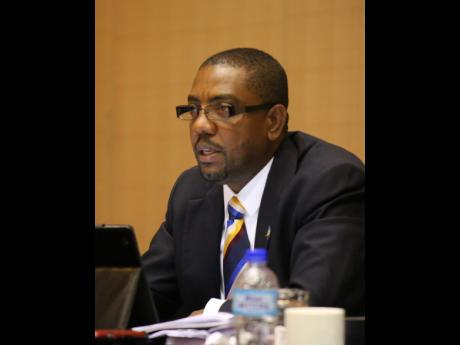Tony Becca: President Cameron changes direction
Dave Cameron, the embattled West Indies Cricket Board (WICB) president, has had second thoughts. Following an apology to CARICOM, he has decided to meet urgently with the representatives of the people.
CARICOM is worried about West Indies cricket. It looked at it, and on November 4, it called the WICB to an urgent meeting to discuss a recommendation to dissolve the board and to put in an interim board.
However, obviously knowing that CARICOM had no authority to do so, in a show of defiance, the board, through President Cameron, wrote back saying that it was too busy, and instead, invited them to attend its directors' meeting on December 12.
That caused a stir and left many people fuming, and as a result, three past presidents of the board - Pat Rousseau, Wes Hall, and Ken Gordon - as well as Keith Mitchell, prime minister of Grenada and head of CARICOM's committee on sports, came out swinging and claiming, among other things, that the WICB was disrespectful to the CARICOM leaders.
CARICOM has no legal authority to interfere with the running of the WICB, or its existence. However, as the representative of the elected governments of the region and in the interest of the people, it has a moral responsibility to intervene and to help solve the problem, especially something as important as the region's cricket.
DISRESPECTFUL TO CARIBBEAN PEOPLE
It is as simple as that, and not even the International Cricket Council (ICC) can prevent it from doing so, certainly not after what is happening in Pakistan, Bangladesh, and Sri Lanka. The board was not only being disrespectful to CARICOM, but also to the Caribbean people.
Cricket, like every other sport, and politics should not mix, so say controlling bodies for sport like FIFA, the IOC, and the ICC, and all over the world, politicians have treated the dictate with tongue in cheek acceptance.
The ICC, the ruling body for cricket, frowns on the close companionship of politics and sports.
Sports and politics, however, have been like twins - or like peas in a pod - from time immemorial, including when the MCC objected to Basil D'Oliveira playing for England against South Africa, the land of his birth, during the days of Apartheid, and all for a peaceful life.
There was also, to name a few, the USA-Russia quarrels which affected the Olympic Games in 1980 and 1984, and the generosity of China and Taiwan, which saw the erection of nice, new stadia in the West Indies to facilitate the 2007 World Cup of Cricket.
Sports, and cricket, could do nothing about that, and neither can cricket do anything about what transpires in places like Pakistan, Bangladesh, and Sri Lanka, where the governments select the presidents, the selection committees, and whenever they feel a need to, also the teams, or a player or two.
The basic truth is that when these rules were written, some time back in the early 1800s, they were written when England, Australia, and South Africa were the sole members, when cricket was a small sport, when the three countries were rich, and when nobody really thought of political interference in sports.
Today, however, more than 100 years on, things have changed. Cricket has got big; sports and cricket are big business. Many countries - poor countries from Asia, Africa, and the Caribbean - are involved. Some of them - most of them - cannot afford to play cricket at certain levels, and the governments are asked to subsidise their participation in one way or the other.
The governments, for example, are asked to underwrite certain things, to facilitate certain things, and to give waivers for certain things.
In many respects, the governments pay the piper, and he who pays the piper, oftentimes calls the tune.
This sad truth is that the WICB and West Indies cricket have survived because of the West Indies governments, even though some of them, because of necessities, have sometimes reneged on promises.
PLEDGING MONEY
There were times when the governments were asked to and pledged money to try and offset the players' non-appearance in English first-class cricket, and money to try and stop our players from going to South Africa during the time of Apartheid, and they never delivered, most of them.
With that aside, however, West Indies cricket is too important to the West Indies people, and it has been so for nearly 100 years for those who play, those who watch and those who govern it not to understand its importance and to accept it.
CARICOM has a right to see that things are run properly in everything Caribbean. The people have given them that right. There is no doubt that cricket - probably more than any other thing, probably more than it is even in England - is Caribbean, and it is good to see that Cameron and the WICB finally realise that, or are willing to admit that that is indeed so.
It is left to see who is bigger: Cameron and the WICB or CARICOM representing the people, and who will really bow to the other in this important battle for the survival of cricket in the region.
It is easy to say, "I am sorry", without really meaning to say so.

